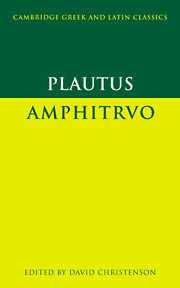Roman Comedy
from Introduction
Published online by Cambridge University Press: 05 March 2013
Summary
Greek Background
Already within the lifetime of Aristophanes, the bawdy, interactive, and fantastical style of comedy of fifth-century Athens later to be designated ‘Old Comedy’ began to take a new direction. In the last plays of Aristophanes, the role of the chorus that had figured so prominently earlier in his career is noticeably curtailed, and signals a general trend toward suppression of music and dance as organic features of comedy. His Ec. and Pl., both dated to a period within ten years of his death in 386 bc, by convention mark the transition to the so-called ‘Middle Comedy’, a term that conveniently describes the forms of comedy that evolved over the first three-quarters of the fourth century. Change of course was gradual rather than instantaneous, and very different syles of comedy must have co-existed for much of this century. The use of masks, for instance, persisted into New Comedy, though the particular types evolved as comic plots changed. In general, it is clear that the political and intellectual life of Athens ceased to occupy centre stage in this period as comedy became more international and more universal themes found acceptance. Though Middle Comedy survives today only in the form of titles and mostly short quotations, these suggest a lively and versatile repertoire, even if such trademarks of Aristophanic theatre as unrestrained obscenity, imaginative and grossly padded costumes (outfitted with phalli), exuberant song and dance, and relentless satire were diminished or disappeared altogether. Apropos of Am., the period of Middle Comedy clearly was one in which both doubles-plays and travesties of myth were commonly staged. Mythological burlesque eventually seems to have disappeared in favour of plays on more mundane subjects featuring stock characters such as pimps, prostitutes, parasites, clever slaves, cooks, and lovesick young men; some of these types were inherited from Old Comedy, but all were figures from everyday life as well. With this growing movement away from the fantastical conceptions of Old Comedy, comedy had reached a transitional, more ‘realistic’ phase. At the same time, fourth-century comedy was much affected by the enduring influence of Euripides, whose plays had blurred generic distinctions by largely ‘demythologizing’ tragedy and refocusing it on everyday domestic life, while placing a new emphasis on psychological realism.
- Type
- Chapter
- Information
- Plautus: Amphitruo , pp. 4 - 12Publisher: Cambridge University PressPrint publication year: 2000

